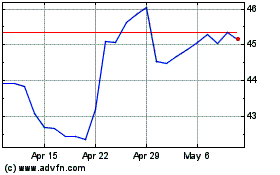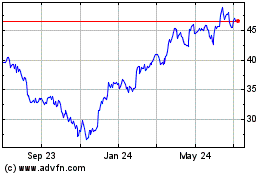GM Loosens Terms for Some Suppliers
June 17 2016 - 2:30PM
Dow Jones News
General Motors Co. will allow roughly 400 parts makers providing
components for new vehicles in Mexico and Brazil to periodically
renegotiate contracts, an unusual break for suppliers facing
financial pressures from rising materials costs and unstable
foreign currencies.
At least once a year, the parts makers can now renegotiate terms
when hit by unexpected economic pressures, such as currency
fluctuations, GM's purchasing chief said Friday. The move comes as
GM prepares to invest $5 billion over the next decade to develop a
new group of Chevrolet vehicles to sell in Mexico and Brazil
starting with the 2019 model year. Those vehicles are also set to
be sold in India and China.
The concession is unusual for GM, which historically fights for
ironclad contracts that squeeze suppliers dependent on them for
business. But the Detroit auto maker, which spends $85 billion
annually as the world's largest car-parts purchaser, also needs to
ensure suppliers don't suffer too much financial strain to avoid
production disruptions.
Economic turmoil in Brazil, for instance, lessens GM's leverage
at a time when the auto maker wants to roll out cars there. "There
is a lot of hesitancy by suppliers to invest there," said Steve
Kiefer, GM's purchasing chief, in an interview. "But we are focused
on the Brazil market, and we want to work together with our
suppliers to make that work."
Mr. Kiefer has been exploring new strategies for dealing with
suppliers since taking the purchasing helm at GM in November 2014.
A former employee for three decades at Delphi Automotive PLC, one
of GM's largest suppliers, Mr. Kiefer is allowing longer-term
contracts and consulting more with parts makers during early design
stages for new vehicles.
He is also forging pacts that allow companies providing
driverless-car technologies—such as adaptive cruise control and
collision-warning systems—to supply competing car makers and
maintain intellectual-property rights in exchange for giving GM
first crack at their new technologies.
"What we have today are fixed, very rigid contracts and we tell
the suppliers don't bother us with the details," Mr. Kiefer said.
"On a very narrow band of business, that approach works. But when
you have moving raw-material costs and currency rates, you find
yourself spending too much time fighting over that.
"What we are trying to do here is take that all off the table by
adopting a simple formula that is more predictable and allows both
sides to share in the ups and downs of those costs."
GM's reputation among suppliers has long trailed competitors,
with the Detroit auto maker finishing in fourth place in a recent
survey of working relations. Toyota Motor Corp. of Japan took the
top spot in the survey.
"I have never heard anything like this before," said John Henke,
president of Birmingham, Mich.-based Planning Perspectives Inc.,
referring to GM allowing parts makers to renegotiate contracts. "It
will be prudent for the other auto makers to quickly follow since
about 70% of their revenue is spent on suppliers." Mr. Henke's firm
conducted the survey of supplier working relations by polling 647
salespeople from 492 top suppliers that negotiate with auto
makers.
Write to Jeff Bennett at jeff.bennett@wsj.com
(END) Dow Jones Newswires
June 17, 2016 14:15 ET (18:15 GMT)
Copyright (c) 2016 Dow Jones & Company, Inc.
General Motors (NYSE:GM)
Historical Stock Chart
From Mar 2024 to Apr 2024

General Motors (NYSE:GM)
Historical Stock Chart
From Apr 2023 to Apr 2024
